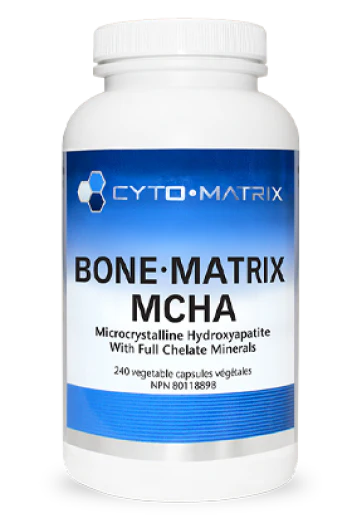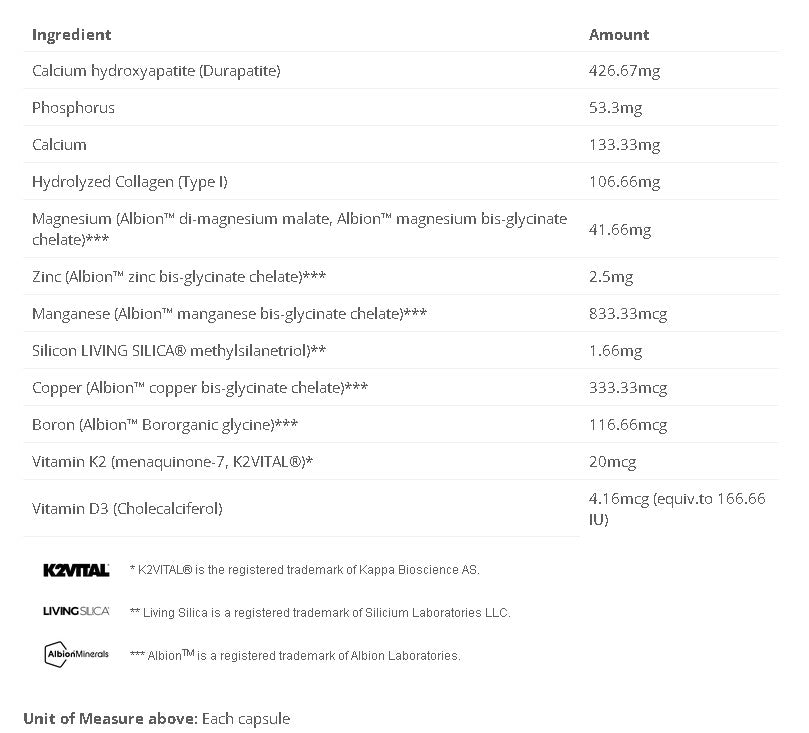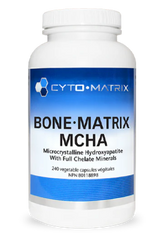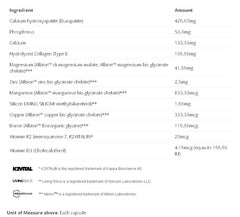



Bone Matrix MCHA
- 58.99$
0.00$- 58.99$
- Unit price
- per
Description
x- Microcrystalline Hydroxyapatite (MCHA) Complex provides calcium and phosphorus, natural growth factors, collagenous and non-collagenous proteins to slowly release calcium, stimulate osteoblast activity and support bone mineral density.
- MCHA comes from pasture-fed, outdoor-raised cattle, without the use of antibiotics or growth hormones.
- Vitamin K2 is supplied as K2Vital®, a microencapsulated, soy-free form that is significantly more stable than other MK-7 materials, to activate osteocalcin and matrix GLA protein.
- Vitamin D3 is necessary to optimize calcium absorption from the digestive tract.
- Silicon is supplied in the most stable and bioavailable form of monomethylsilanetriol (MMST) to stimulate collagen synthesis and improve bone mineral density.
- Zinc, copper, boron, and manganese are added as cofactors for enzymes involved in bone synthesis and calcium regulation.
A comprehensive blend of essential nutrients for optimal bone health. Microcrystalline hydroxyapatite provides slow-release calcium, along with phosphorus, collagen, and other growth factors to stimulate osteoblasts and support bone mineral density.
Calcium is one of the most commonly supplemented nutrients in the natural health industry, typically to support bone health. This is with good reason, given that osteoporosis affects at least one in three Canadian women and one in five Canadian men during their lifetime. This means that over 2 million Canadians are at high risk of bone fractures, with a reduced quality of life, reduced mobility, and a lack of independence. Diet and lifestyle have been shown to play an important role in the progression of the disease, allowing for proactive risk modification and mitigation. With this in mind, calcium is by far the most well-known nutrient required for strong and healthy bones.
Calcium can be provided in many different forms, such as citrate, carbonate, bisglycinate, malate, or even in a hydroxyapatite complex. Microcrystalline hydroxyapatite (MCHA) complexes closely replicate the form of calcium found in human bone. Furthermore, microcrystalline hydroxyapatite has the advantage of providing not only calcium, but also collagenous and non-collagenous proteins, various growth factors, and phosphorus—all compounds needed to stimulate osteoblasts and support bone structures. Comparative studies with other forms of calcium, such as calcium carbonate, have shown that MCHA is significantly more effective at supporting markers of bone mineral density. Another advantage of MCHA may be its slow, natural release of calcium into the bloodstream, allowing for better regulation of this mineral, which also plays an important role in cardiovascular health.
One of the most unique nutrients for bone health is silicon in Living Silica®, a mineral that has the ability to regulate fibroblast activity and hydroxylation enzymes. Epidemiological data supports silicon's role in preventing osteoporosis, while silicon supplementation has been shown to increase bone collagen content and improve bone mineral density. The problem is that most forms of silicon are insoluble, unstable, and poorly bioavailable. Living Silica® monomethylsilanetriol (MMST), a completely stable and well-absorbed form, is the exception to this group of organosilicon molecules. Comparative studies have shown that MMST is 3.5 times better absorbed than choline-stabilized orthosilicic acid (Ch-OSA) and 21 times better absorbed than horsetail, bamboo, and colloidal silicon sources, making it an excellent choice for optimal bone health.
Various other vitamins and minerals are needed to support the bone-building process. For example, vitamin D3 is essential for calcium absorption in the digestive tract, while approximately 50 to 60 percent of magnesium is stored in bones and is needed to activate enzymes related to vitamin D3 metabolism. Vitamin K2 has emerged as a key player in the bone health category, thanks to its ability to activate two proteins—osteocalcin and matrix-GLA protein—to direct calcium toward the skeletal system and away from the cardiovascular system. Trace minerals such as zinc, manganese, copper, and boron also play crucial roles in bone health.
Produits recommandés
Produits récemment consultés
- Choosing a selection results in a full page refresh.



